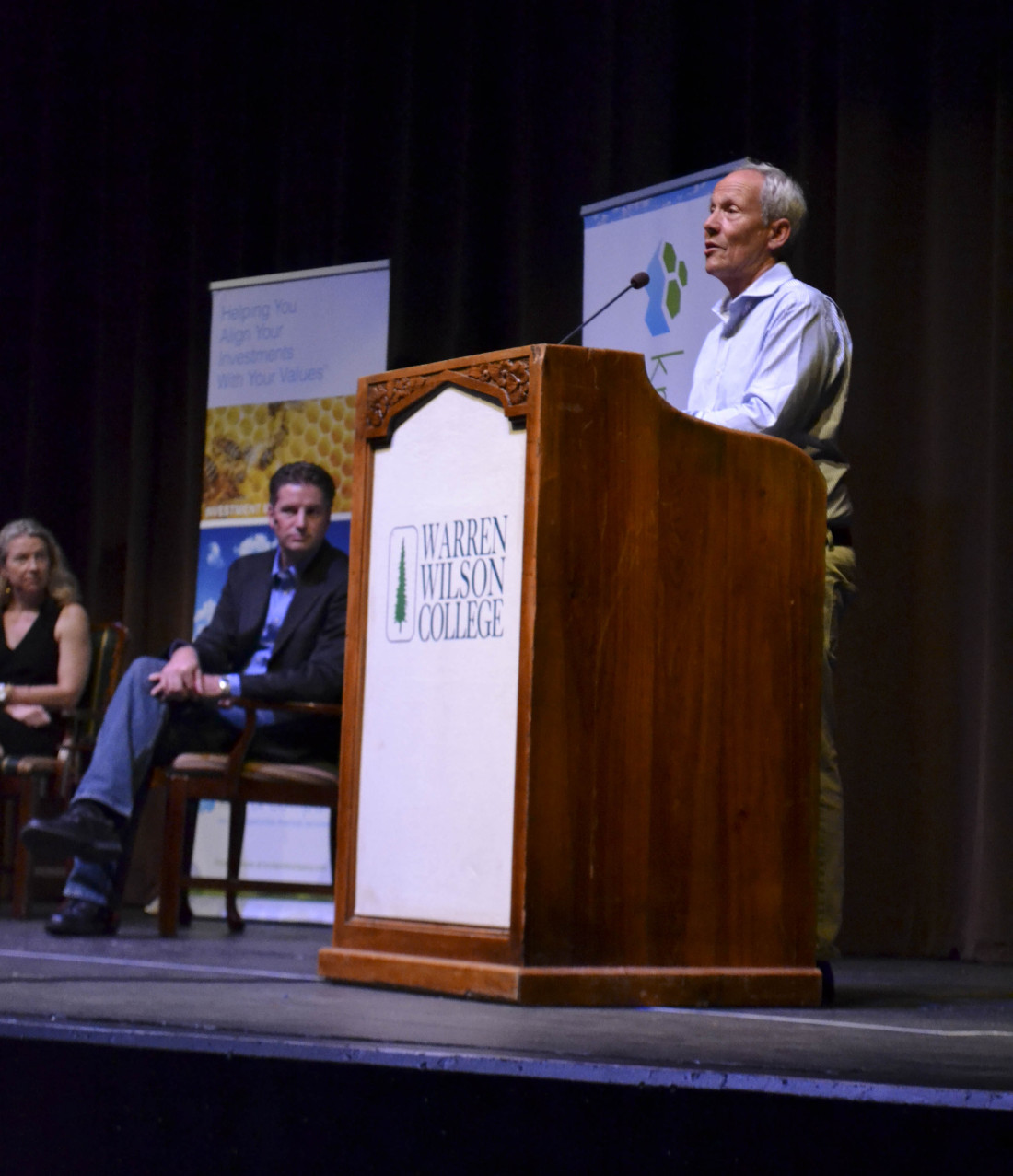by Lyn May
Warren Wilson College had the pleasure of hosting a panel on sustainable investing last week. With Warren Wilson ranking 18 on The Princeton Review‘s list of Top 50 Sustainable Schools, it was in some ways a perfect venue. The Sept. 3 event included Patagonia’s Chief Storyteller, Vincent Stanley, Krull & Company’s president, Peter Krull, and Leslie Samuelrich, president of Capital Management for Green Century.
In his introduction, college President Steve Solnick, stated that Warren Wilson is the “only liberal arts college with a national student body that combines work and community engagement into our educational program.” Students participate in a wide range of work: residence-hall maintenance, work in the library, dining halls, on the farm and garden, and on dozens of other work options.
Vincent Stanley has been with Patagonia almost since its 1973 inception, when the company mainly manufactured climbing gear for, what was at that time, the modest population of U.S. rock climbers. Stanley worked inspecting ice axes, looking for hairline fractures, to ensure safe, quality tools for climbers.
“Our sense of responsibility was to our friends,” Stanley explained. Because the climbing community was so small, he and other Patagonia employees knew who would be using Patagonia equipment, thus making them feel especially accountable when it came to producing climbing gear.
When Patagonia expanded into the clothing industry, Stanley recalled, the company came to realize the environmental impacts of using conventional cotton that had been grown with pesticides and chemical fertilizers. Patagonia then made a decision to phase out conventional cotton and transition to organic cotton over an 18-month period, starting with its sportswear.
“We learn from failure and gain confidence from success,” Stanley said regarding that transition.
Anyone who’s owned Patagonia clothing or equipment knows the quality of the product is sturdy and its lifetime long, he said. The mission of the company is to create clothing and equipment that can be used for a substantial amount of time, and then recycled into different clothing and equipment that can be used for another substantial amount of time.
“Nothing we do is capable of being completely sustainable,” Stanley said. He pointed to five considerations for a responsible business — which are detailed in The Responsible Company, which he co-wrote with Yvon Chouinard — financial health, employees, customers, community and the natural world. With these things in mind, he said, negative environmental impacts can be minimized.
Pete Krull of Krull & Company, whose business advocates for socially and environmentally responsible investments, introduced Leslie Samuelrich.
When she was a senior in college, Samuelrich planned to be a stockbroker. But after interning with one, she decided she’d rather pursue a career with a bigger positive social impact and so worked as an environmental activist before joining Green Century three years ago.
Samuelrich described three reasons why people are divesting from fossil-fuel companies, the first being moral alignment of values with investment.
“People have applied their values to their investments,” Samuelrich said. Typically people who are taking environmentally conscious actions in their private lives are not investing in fossil-fuel companies, she said.
The second reason, she said, are the political ramifications of divestment: Divesting from fossil-fuel companies reduces their financial power, and puts it in the hands of others that area actively fighting climate change and widespread destruction of our environment.
“It’s not that we don’t know what to do to stop carbon emissions. It’s that we don’t yet have the political power to bring these solutions into play,” Samuelrich said.
The third reason for divestment, according to Samuelrich, goes beyond moral and political reasons: The strategy is financially effective.
“The ‘energy sector’ is one of the most volatile sectors you can invest in. Period,” she said, adding that “timing the market is a myth.”
She went on to explain how currently excessive carbon reserves (stranded assets) are tied up in fossil-fuel companies, saying that when the right policy is passed, these companies will have a cap on carbon, and there will be no excessive carbon reserve. Samuelrich said her goal is to see the two top fossil-fuel companies phase out in the next five years.
Lyn May is an undergraduate student at Warren Wilson College, studying creative writing. She is the assistant editor of the college’s student newspaper, The Echo, where this article also appears.






Lyn, thanks for attending and covering the event! There’s a little typo in this quote: “The ‘energy scepter’ is one of the most volatile scepters you can invest in. Period,” she said, adding that “timing the market is a myth.” Instead of scepter it should be SECTOR. Thanks for making the correction if you can! More info can be found at http://www.greencentury.com
Thanks, Leslie. We’ll correct the wording.